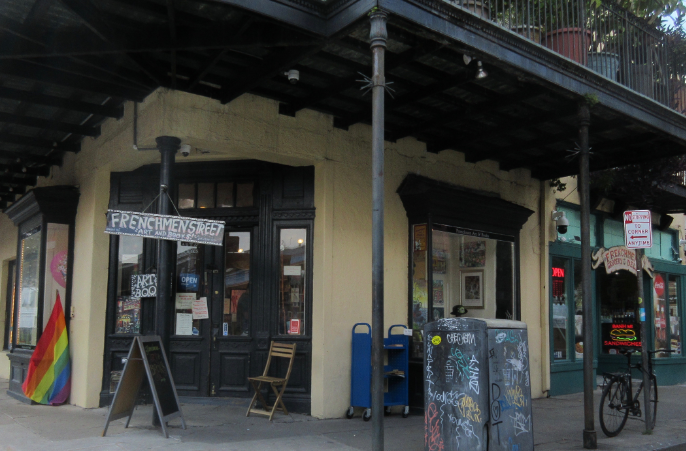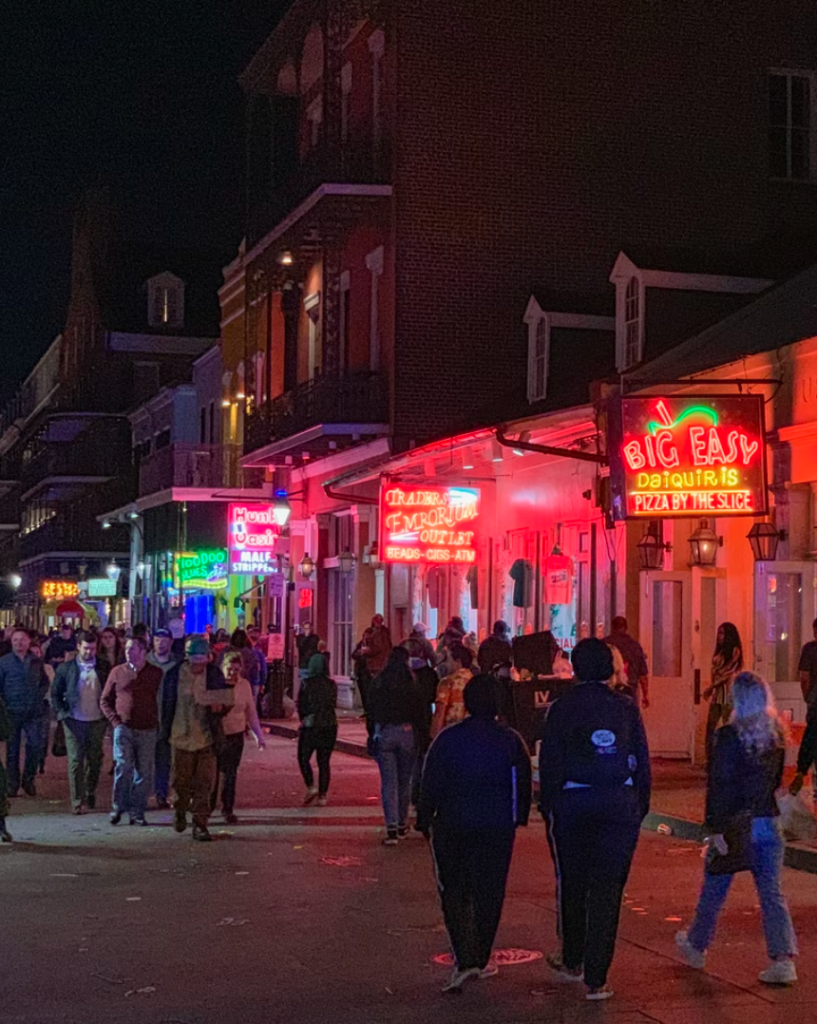Live music—the bedrock of New Orleans’ reputation as a music city—is in danger of collapsing.
This is kind of a complex issue, so bear with me.
OffBeat has always been focused on live music. Without live music, New Orleans would not be the music mecca it is. Live music is the fist thing that groups who want to develop our music industry need to address. Yeah, it’s a gig economy, but it’s a start for any musician who wants to make a living playing music. It’s elemental. But getting $100 a gig today is not the same as making $100 three years ago or even last year. Costs of everything—especially housing, food, insurance—have skyrocketed. The live music scene is really in crisis.
For almost four decades OffBeat has been dedicated to the music community—the musicians and bands; trying to educate musicians on how to take care of themselves and their businesses; creating opportunities for musicians, bands and music industry members to make money making music; connecting members of the statewide music community to each other and to others outside New Orleans via directories of musicians, bands, and music businesses; recognizing members of the music community for their art and ability to reach others through their music, and those music businesses who are attempting to support and elevate the music community. But there’s so much more to be done. I admire GNO, Inc. and its initiatives to attract music businesses here and to develop sync licensing models and mentality, as well as education. But we need more. We need a focus on one of the more urgent problems: musicians cannot live on what they are being paid to play. Music venues cannot afford to stay open, much less pay bands what they deserve.
COVID really did a number on musicians and music venues. It almost destroyed both. I am thankful that the government stepped in to help. But COVID also created a false sense of security in that everyone thought that the post-COVID surge last summer was going to last. It obviously has not, as there are multiple music venues that are closing in August (this has not ever happened to the extent it is happening this summer: closing for at least a couple of weeks during August are the Maple Leaf, d.b.a., Chickie Wah Wah and more) because the cost of just keeping their doors open will simply kill their businesses. And then there’s the horrible heat—which isn’t going away in future years.
The music venues obviously aren’t the only ones: when they close, musicians have no place to play. The sound and production people suffer. Doormen. Security people. Bartenders. Servers.
There are some urgent issues that are also coming to a head with many music venues, probably because of the dearth of audiences these days (blame that on social media and streaming). Fewer tourists are here in the summer (certainly much less than last year). The cost of everything, including insurance (for the venues) has gone up astronomically. But the musicians are still earning the same amount of money they were paid five or even 10 years ago.
This is a complex issue. The musicians especially deserve to make more money. But that will never happen unless there is a solution on how to compensate bands and to also sustain the music venues. The standard practice now in our two main entertainment districts (Bourbon and Frenchmen) is to pay the band a percentage of the bar, or a small guarantee ($100 or $200 per band) plus a percentage of the bar in venues that do not charge a cover.
There’s a clear relationship between how much bands are paid and whether or not there’s a cover charge at the venue. Both the Bourbon and Frenchmen Street models (no cover, open door policy, bands paid a bar percentage) clearly benefit the venues. Until musicians can get themselves in a position to demand better pay, nothing is going to change, because, frankly most of the venue operators are more concerned with their bar ring rather than paying the bands who are the draw.
If a music venue cannot afford to stay open because their cost of operation is too much, then the musicians don’t have a chance in hell of making a living wage.
There’s been a lot of talk about musicians organizing to demand better pay for live music. The only way this will ever work is to embrace the musicians’ union model, and for all bands and musicians to work together to insure that everyone can make a living wage. That’s a pipe dream, though, because some bands usually will fight to get a (poorly-compensated) gig whether it pays well or not. There have been many musicians who refuse to play in these districts (I forgot to mention St. Claude Avenue) because they just can’t make enough money with the “percentage” pay. But sure enough, another (usually young) band will welcome the chance to play for peanuts and tips and take a poorly-compensated gig.
This is not how the entire music community can grow, produce a living wage for bands and a thriving music scene. A union would potentially solve this problem, but it will only work if all musicians band together and refuse to pay for a crappy wage. That is never, ever going to happen, unfortunately. It’s also worthwhile to note here that the local American Federation of Musicians Local 174-496 has only 300 members (I would assume many of them are LPO musicians). The union minimum pay requirements are more important for an organization like the LPO, or for session/recording work, not performing at a venue on a regular basis. Moreover, Louisiana is a right-to-work state and it’s against the law for any contractor (in this case, musicians) being required by state law to be paid a minimum wage. Can’t happen in Louisiana.
So what can we do to insure that both the venues and the musicians can earn both a comfortable living? We have to change the dynamic; the business model has changed.
Sticking my neck out—as usual—here are some ways that I think we can make some positive progress (I welcome your input and feedback on this; just email me your comments and ideas).
-
- The City should require all music and entertainment venues to operate with their DOORS CLOSED. This will eliminate the mentality that music is background noise for the street party, and not valuable and worthy of being paid for (open venue doors do this). When you charge a cover, the consumer will grasp that there is indeed value to our music and entertainment. I doubt seriously if any tourist will stop visiting New Orleans if they are required to pay a cover at any venue on Bourbon or Frenchmen. But to test this theory, let the City require every venue with entertainment to close their doors and charge a cover for at least one day a week (Friday or Saturday) for say, six months to a year. I know this is radical, but it will demonstrate that this theory will or will not work. I can already hear the venues, bars and liquor and beer distributors gathering up their lobbyists to protest this idea because they think people won’t consume as much alcohol. This is nonsense, IMO, buta test period of six months to year will tell the tale. Cover charges (and tips, if applicable) of course go to the musicians.
- Speaking of alcohol, we all know that literally nothing happens in New Orleans that doesn’t revolve around alcohol consumption: Mardi Gras, festivals, parades, events, you name it. Alcohol rules every event that makes New Orleans New Orleans: it all revolves around drinking. Alcohol and beer manufacturers and distributors are the ones making the most of our current situation. How about if we create a “New Orleans Gig Foundation” that requires contribution from alcohol/beer folk (along with other non-profits) to help pay? I guarantee that alcohol purveyors will not refuse to do this if it will help their retailers stay alive. And, of course it will benefit musicians, which the liquor/beer people can use for their own positive promotion.
- The City should develop and enforce criteria for what is a “music club” and what is a “bar with music.” A music club—a “listening room”—is one that charges a cover (either at the door or with an upcharge on each individual consumer bill that’s strictly paid to the band). A “bar (or restaurant) with music” is one that does not charge a cover. But here’s how this might work: a venue that is a “club” will receive a lot more benefits from the City that a “bar” does not, such as extra advertising and promotion, especially from entities like New Orleans & Company. A “club” will get an official designation from the City that demonstrates that it supports musicians and the city’s music culture. This could also be posted (with an official logo) in venues’ windows, and in their own promotion and advertising. Further, if “clubs” install noise abatement insulation, if they conform to requirements, if they demonstrate their support of local musicians, they get significant tax breaks. Music “clubs” should get special treatment because they are contributing to the culture of our City and they are obviously supporting local musicians. This will also be an incentive for the “bars” to convert to “clubs.” There should be developed an attitude of respect for music and its impact on tourism as well as our local economy.
All of these items could be overseen and organized by the City’s Office of Nighttime Economy.
Again, these are my ideas—for better or worse—and I expect to get criticism (just keep it respectful online, if you would, and offer your counters or additions to these ideas). Would love to get your feedback and suggestions. We need to address these issues now. It’s just going to get worse unless we can change the business model.






